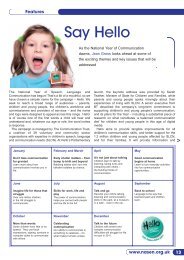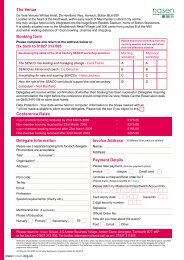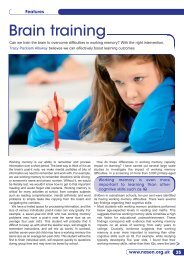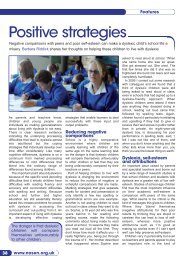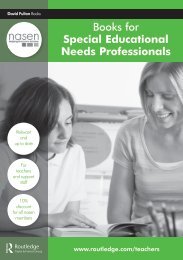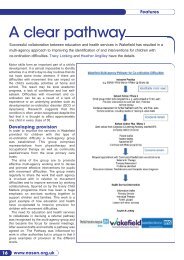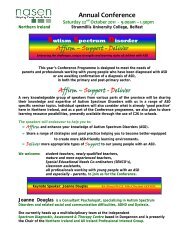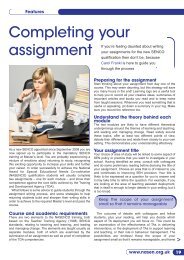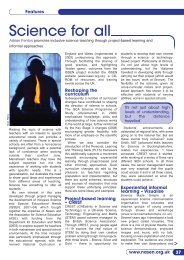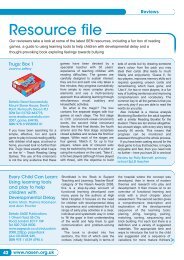The role played by grandparents in family support and ... - Nasen
The role played by grandparents in family support and ... - Nasen
The role played by grandparents in family support and ... - Nasen
Create successful ePaper yourself
Turn your PDF publications into a flip-book with our unique Google optimized e-Paper software.
with children at home, have been tentatively developed <strong>by</strong>the Basic Skills Agency. Accessibility is also noted asimportant: for example, writ<strong>in</strong>g <strong>in</strong> pla<strong>in</strong> English: ‘I foundthe jargon-buster useful <strong>and</strong> have passed it on to other sets of<strong>gr<strong>and</strong>parents</strong>’ (Gyllenspetz, 2007, p. 23).As a ‘community resource’ <strong>in</strong> l<strong>in</strong>e with the current Englishpolicy of extended schools (DfES, 2004a, b), schools canplay an important <strong>role</strong> provid<strong>in</strong>g <strong>support</strong> for <strong>gr<strong>and</strong>parents</strong>,‘signpost<strong>in</strong>g’ them to alternative social <strong>and</strong> health care communityresources. Collaborative <strong>and</strong> co-ord<strong>in</strong>ated <strong>in</strong>teragencywork<strong>in</strong>g is thus important for schools <strong>and</strong> their staff.However, not all <strong>gr<strong>and</strong>parents</strong> want or need the same degreeof <strong>support</strong>. Watson <strong>and</strong> Kobl<strong>in</strong>sky’s (2000) study foundclass differentials, with work<strong>in</strong>g-class gr<strong>and</strong>mothers morelikely to express a need <strong>and</strong>/or desire for more <strong>support</strong> thanmiddle-class gr<strong>and</strong>mothers. Furthermore, one cannotpresume that schools <strong>and</strong> their staff will <strong>in</strong>clude all types of<strong>gr<strong>and</strong>parents</strong> equitably or even want to beg<strong>in</strong> to movetowards a broader ‘<strong>family</strong> focus’.Although relatively small scale, F<strong>in</strong>dler’s (2007) study ofma<strong>in</strong>stream <strong>and</strong> SEN teachers <strong>in</strong> Israel (80 ma<strong>in</strong>stream <strong>and</strong>82 SEN) found a complex <strong>and</strong> somewhat contradictorysituation, with teachers (both ma<strong>in</strong>stream <strong>and</strong> SEN)recognis<strong>in</strong>g the <strong>support</strong>ive <strong>role</strong> that <strong>gr<strong>and</strong>parents</strong> generallyplay <strong>in</strong> <strong>family</strong> life, but, <strong>in</strong> practice, <strong>in</strong>volv<strong>in</strong>g some morethan others – <strong>in</strong> particular, maternal rather than paternal<strong>gr<strong>and</strong>parents</strong>. F<strong>in</strong>dler suggests this reflects the teachers’wider commonsense knowledge of who provided the most<strong>support</strong> <strong>and</strong> its perceived value. F<strong>in</strong>dler also found that theeveryday knowledge of both ma<strong>in</strong>stream <strong>and</strong> SEN teacherswas not used to <strong>in</strong>form or guide their practice whenwork<strong>in</strong>g with families, as <strong>gr<strong>and</strong>parents</strong> were <strong>in</strong>frequently<strong>in</strong>volved. Furthermore, the teachers she <strong>in</strong>terviewed werenot <strong>in</strong>terested <strong>in</strong> or will<strong>in</strong>g to change or even extend theirfuture practice; there was little enthusiasm for work<strong>in</strong>g with<strong>gr<strong>and</strong>parents</strong>.Schools <strong>and</strong> <strong>gr<strong>and</strong>parents</strong> with children whohave SENVery few specific studies were identified explor<strong>in</strong>g schoolswork<strong>in</strong>g with or consider<strong>in</strong>g, the <strong>support</strong> that <strong>gr<strong>and</strong>parents</strong>provide to families of children with SEN. One notableexception is the development of a model of ‘extended <strong>family</strong>tra<strong>in</strong><strong>in</strong>g’ at Sunfield, an <strong>in</strong>dependent, UK-based specialschool (Carpenter, Addenbrooke, Attfield <strong>and</strong> Conway,2004). <strong>The</strong> school worked with a range of <strong>family</strong> members,<strong>in</strong>clud<strong>in</strong>g <strong>gr<strong>and</strong>parents</strong>, recognis<strong>in</strong>g the importance of professionals<strong>and</strong> different members of families shar<strong>in</strong>g ideas.Indeed, <strong>family</strong> members frequently adopted the <strong>role</strong> of‘tra<strong>in</strong>ers’, an experience viewed as positive <strong>by</strong> all parties –families <strong>and</strong> professionals alike. Although progressive, thiswork rema<strong>in</strong>s small scale <strong>and</strong> specific. <strong>The</strong> general dearth ofstudies, especially larger scale studies, is an important gap<strong>in</strong> the literature as children with SEN have many differenttypes of <strong>support</strong> needs <strong>and</strong> disabilities, <strong>and</strong> there are a substantialnumber of pupils with SEN: currently 229,100pupils (2.8 per cent) across all English schools have Statementsof SEN <strong>and</strong> a larger number (1,333,400 pupils or 16.4per cent) have SEN but do not have Statements (DfES,2007b). Despite this, the literature surround<strong>in</strong>g ma<strong>in</strong>streamschools <strong>and</strong> <strong>gr<strong>and</strong>parents</strong> <strong>and</strong> the <strong>support</strong> <strong>gr<strong>and</strong>parents</strong> canprovide to disabled children (summarised above) does raisea number of issues.Past studies explor<strong>in</strong>g the benefits of <strong>in</strong>tergenerationallearn<strong>in</strong>g <strong>and</strong> <strong>gr<strong>and</strong>parents</strong> as volunteers have tended tofocus on early <strong>and</strong> primary years education (Al-Azami,2006; Gyllenspetz, 2007; Kenner, Arju, Gregory, Jessel <strong>and</strong>Ru<strong>by</strong>, 2004; Kenner, Ru<strong>by</strong>, Jessel, Gregory <strong>and</strong> Arju, 2007).However, the educational <strong>and</strong> <strong>support</strong> <strong>role</strong> of <strong>gr<strong>and</strong>parents</strong>may have an extended relevance <strong>and</strong> value for children withSEN, especially those with learn<strong>in</strong>g disabilities. Develop<strong>in</strong>gcore language, l<strong>in</strong>guistic <strong>and</strong> numeracy skills rema<strong>in</strong>simportant for many children <strong>and</strong> young people with learn<strong>in</strong>gdisabilities <strong>in</strong> both secondary <strong>and</strong> further education. Many‘life skills’ <strong>and</strong> ‘preparation for <strong>in</strong>dependence’ courses<strong>in</strong>clude cook<strong>in</strong>g, garden<strong>in</strong>g <strong>and</strong> shopp<strong>in</strong>g modules, which,as noted earlier, are key <strong>in</strong>tergenerational learn<strong>in</strong>g activities.For young people with SEN, this type of learn<strong>in</strong>g could bean important resource for schools <strong>and</strong> colleges to utilise. Inaddition, Kenner <strong>and</strong> colleagues’ (2007) work demonstratesthe value of reciprocal learn<strong>in</strong>g for both <strong>gr<strong>and</strong>parents</strong> <strong>and</strong>gr<strong>and</strong>children. For children <strong>and</strong> young people with SEN,show<strong>in</strong>g <strong>gr<strong>and</strong>parents</strong> ‘how to do th<strong>in</strong>gs’, such as demonstrat<strong>in</strong>gIT skills, may provide an opportunity for schools tofacilitate positive learn<strong>in</strong>g experiences. With the currenteducational focus on educational outcomes, such as SATS<strong>and</strong> exam results, opportunities for young people with SENto achieve are not always apparent.<strong>The</strong> value of provid<strong>in</strong>g accessible school-based <strong>in</strong>formationfor <strong>gr<strong>and</strong>parents</strong> (Gyllenspetz, 2007) <strong>and</strong> also disabilityspecific<strong>in</strong>formation to <strong>gr<strong>and</strong>parents</strong> of disabled children(Burns <strong>and</strong> Madian, 1992; F<strong>in</strong>dler, 2007; Schilmoeller <strong>and</strong>Baranowski, 1998) was noted above. Schools have thepotential, especially <strong>in</strong> their ‘extended’ status, to be a usefulresource <strong>and</strong> <strong>in</strong>formation provider for families of childrenwith SEN <strong>in</strong> terms of <strong>in</strong>formation for <strong>gr<strong>and</strong>parents</strong> abouttheir gr<strong>and</strong>child’s school <strong>and</strong> also disability-specific <strong>in</strong>formation.Current English guidance (DfES, 2006) advocatesthe value of ‘parent <strong>support</strong> advisers’; this could beextended to <strong>gr<strong>and</strong>parents</strong> of children with SEN. In addition,schools, especially special schools, have frequently been animportant resource for parents of children with SEN toaccess other professionals <strong>and</strong> services, especially health<strong>and</strong> social care. Extend<strong>in</strong>g this provision to <strong>gr<strong>and</strong>parents</strong>,recognis<strong>in</strong>g that <strong>gr<strong>and</strong>parents</strong> of children with SEN maylike to be <strong>in</strong>volved <strong>in</strong> discussions/programmes abouttheir gr<strong>and</strong>child, could be advantageous. Parents provid<strong>in</strong>g<strong>in</strong>formation to <strong>gr<strong>and</strong>parents</strong> can, as Schilmoeller <strong>and</strong>Baranowski (1998) <strong>and</strong> Burns <strong>and</strong> Madian (1992) note, beviewed as stressful, <strong>and</strong> schools could help <strong>support</strong> parents© 2008 <strong>The</strong> Author(s). Journal compilation © 2008 NASEN Support for Learn<strong>in</strong>g · Volume 23 · Number 3 · 2008 131



